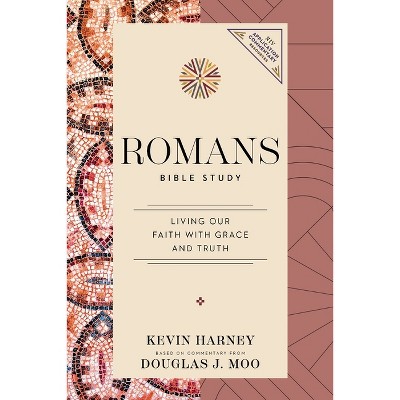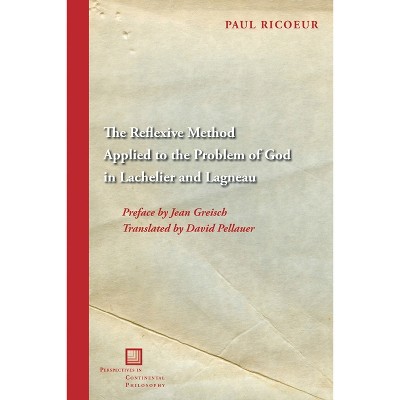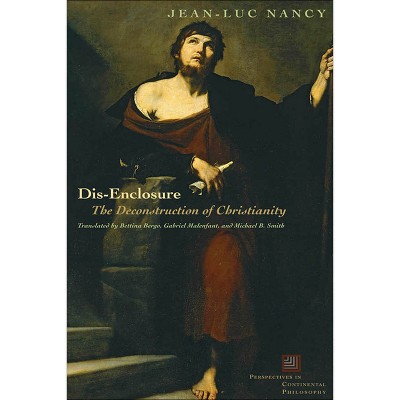Sponsored

A Theology of Failure - (Perspectives in Continental Philosophy) by Marika Rose (Paperback)
In Stock
Sponsored
About this item
Highlights
- Everyone agrees that theology has failed; but the question of how to understand and respond to this failure is complex and contested.
- About the Author: Marika Rose is Lecturer in Philosophical Theology at the University of Winchester.
- 240 Pages
- Religion + Beliefs, Christian Theology
- Series Name: Perspectives in Continental Philosophy
Description
About the Book
This book draws the work of Slavoj Zizek into conversation with the Christian mystical theological tradition in order to propose a materialist account of Christian identity as constituted by failure.Book Synopsis
Everyone agrees that theology has failed; but the question of how to understand and respond to this failure is complex and contested. Against both the radical orthodox attempt to return to a time before the theology's failure and the deconstructive theological attempt to open theology up to the hope of a future beyond failure, Rose proposes an account of Christian identity as constituted by, not despite, failure. Understanding failure as central to theology opens up new possibilities for confronting Christianity's violent and kyriarchal history and abandoning the attempt to discover a pure Christ outside of the grotesque materiality of the church.
The Christian mystical tradition begins with Dionysius the Areopagite's uncomfortable but productive conjunction of Christian theology and Neoplatonism. The tensions generated by this are central to Dionysius's legacy, visible not only in subsequent theological thought but also in much twentieth century continental philosophy as it seeks to disentangle itself from its Christian ancestry. A Theology of Failure shows how the work of Slavoj Zizek represents an attempt to repeat the original move of Christian mystical theology, bringing together the themes of language, desire, and transcendence not with Neoplatonism but with a materialist account of the world. Tracing these themes through the work of Dionysius and Derrida and through contemporary debates about the gift, violence, and revolution, this book offers a critical theological engagement with Zizek's account of social and political transformation, showing how Zizek's work makes possible a materialist reading of apophatic theology and Christian identity.From the Back Cover
"This is the best work I have ever read on Zizek in relation to theology, maybe the best such work possible. Rose's prose style is clear and engaging, and her project significantly advances our understanding of Christian apophaticism, of Zizek's project, and of the potential future stakes of theology for a secular world."--Adam Kotsko, author of Neoliberalism's Demons: On the Political Theology of Late Capital
"An ambitious and significant project in continental philosophy and theology. Engaging Dionysius beyond the usual texts and reading that corpus through Zizek, Rose offers way of linking ontology, language, and theology--through failure--that is theologically productive."--Ellen Armour, Vanderbilt University Everyone agrees that theology has failed; but the question of how to understand and respond to this failure is complex and contested. Against both the radical orthodox attempt to return to a time before the theology's failure and the deconstructive theological attempt to open theology up to the hope of a future beyond failure, Rose proposes an account of Christian identity as constituted by, not despite, failure. Understanding failure as central to theology opens up new possibilities for confronting Christianity's violent and kyriarchal history and abandoning the attempt to discover a pure Christ outside of the grotesque materiality of the church. The Christian mystical tradition begins with Dionysius the Areopagite's uncomfortable but productive conjunction of Christian theology and Neoplatonism. The tensions generated by this are central to Dionysius's legacy, visible not only in subsequent theological thought but also in much twentieth century continental philosophy as it seeks to disentangle itself from its Christian ancestry. A Theology of Failure shows how the work of Slavoj Zizek represents an attempt to repeat the original move of Christian mystical theology, bringing together the themes of language, desire, and transcendence not with Neoplatonism but with a materialist account of the world. Tracing these themes through the work of Dionysius and Derrida and through contemporary debates about the gift, violence, and revolution, this book offers a critical theological engagement with Zizek's account of social and political transformation, showing how Zizek's work makes possible a materialist reading of apophatic theology and Christian identity. Marika Rose is Lecturer in Philosophical Theology at the University of Winchester.Review Quotes
An ambitious and significant project in continental philosophy and theology. Engaging Dionysius beyond the usual texts and reading that corpus through Zizek, Rose offers way of linking ontology, language, and theology--through failure--that is theologically productive.---Ellen Armour, Vanderbilt University
This is the best work I have ever read on Zizek in relation to theology, maybe the best such work possible. Rose's prose style is clear and engaging, and her project significantly advances our understanding of Christian apophaticism, of Zizek's project, and of the potential future stakes of theology for a secular world.---Adam Kotsko, author of Neoliberalism's Demons: On the Political Theology of Late Capital
Rose's book is more than simply a work of theology... Recommended.-- "Choice"
This book is a valuable contribution to anyone remotely interested in political theology, continental philosophy, or method. The clear, concise, and accessible survey of varied works, movements, and figures, itself makes it worth the read. The arguments in the book will challenge the general reader or seminarian to take seriously the social impact--and potential--of philosophical and theological thought. The expert in the fields of continental philosophy or political theology will find a deft web of theological/philosophical conversation that is sure to stir.-- "Reading Religion"
About the Author
Marika Rose is Lecturer in Philosophical Theology at the University of Winchester.Shipping details
Return details
Frequently bought together




Trending Non-Fiction













